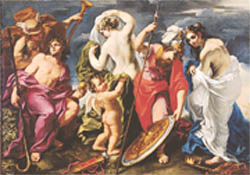 |
ART REVIEW: THE JUDGMENT OF PARIS, recent acquisition, Gallery 5, Ringling Museum of Art, 5401 Bay Shore Road, Sarasota. $9, $8 seniors, free under age 12. Galleries free Saturdays. Call 359-5700. By Joan Altabe Ringling Museum curator Mitchell Merling's sense of humor is showing again. In March, he mounted a ``Tarzan Yell Contest'' to enhance visitor appreciation of 16th- and 17th-century paintings and make palatable what otherwise is difficult to popularize - Baroque painting. It was a stretch, to put it kindly. Last month, Merling picked, for a $250,000 museum purchase, a 68-by-96-and-a-half-inch Baroque painting that he considers ``comic'' - Swiss-born Ludovico David's ``The Judgment of Paris,'' circa 1700. And while his effort to make Baroque fun ended up a bad joke in March, he got it right this time. ``The Judgment of Paris,'' bought from the Newhouse Galleries in New York, is vintage Baroque - melodramatic as all get-out - but it seems to mock itself. Traditionally, painters pictured Paris' story, an old Greek myth, in earnest. David did not. As the myth goes, sheepherder Paris was asked by three goddesses to choose the fairest among them. The choice was between Hera (a.k.a.: Juno), goddess of married women; Aphrodite (a.k.a: Venus), goddess of love; and Athena (a.k.a.: Minerva), goddess of wisdom and moral wars. In effect, Paris was asked to pick between love, marriage and wisdom. As if one precluded the other, necessarily. Paris chose love, and for his prize unaccountably got the world's most beautiful woman, Helen of Troy, even though he loved another - a nymph called Oenone. Painters used to liked to picture the story because it gave them a chance to render nude females. Paris' dilemma also was delicious to them. David's interpretation shows the goddesses in less than godly ways, as though they, too, think the theme funny. But I'll let Merling deliver the punchline. ``Athena (the goddess of wisdom and war) seems anxious to retrieve her armor and speed away to begin the conflict between the Trojans and the Greeks. Although Venus has already won the conflict, she seems in no hurry to get dressed: it is up to her son Cupid to protect her modesty - he holds up her drapery while smiling at us. Juno's pride is unruffled by her defeat. She looks out of the painting and seems to offer wordly power to the beholder (presumably the Roman aristocrat, who was the patron of the painting).'' Clearly these goddesses are not taking the contest seriously, although Paris, who looks pained for choosing, seems to. His was a tough choice, after all. Merling's job as curator of Baroque art also is tough. Just as taste for, say, squid, is acquired, baroque painting - normally heavy with martyrdom - takes getting used to. Wildly emotional, wearing their hearts on their pulsing picture planes, Baroque paintings bear the melodramatic air of a Cecil B. DeMille spectacular - gushing, gaudy and grandiouse, not to mention turgid and lurid. Which is why David's light-hearted treatment is a good addition to the Ringling collection. While it emotes through Baroque's usual high energy and color, it's as Merlin says: funny to watch. There was a time when no self-respecting art lover would collect the sort of thing that the Ringling Museum holds dear. Bear in mind that Baroque art got its name from a disparaging word, barraco, meaning ``misshapen pearl'' in old Portuguese. It was all that straining and turbulence, you see, rather than the quieter, balanced compositions of the Renaissance, that gave Baroque a bad name. Ringling Museum is lucky that Merling has a sense of humor. He found a Baroque work with all the regulation twisting and high color. But this is one Baroque picture that one doesn't have to turn away from in embarrassment. In a word, it's fun. ``That's my main thing,'' said Merling. ``Enjoyment.'' Story Filed By The HERALD TRIBUNE, SARASOTA, FLORIDA NYT-07-17-98 1356EDT< |
